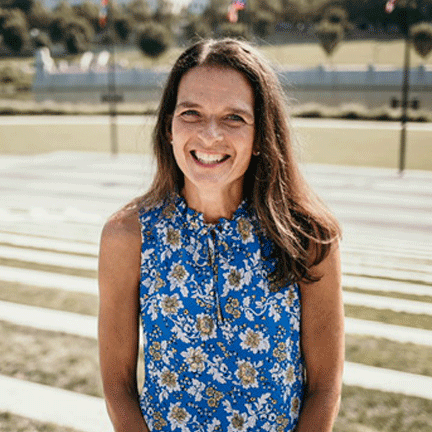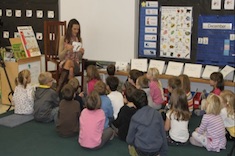I was recently talking to a colleague and shared, “I don’t know my students as well as I did in the past.” I could sense a little surprise in her voice when she restated what I had said with a little inflection to bring it back as a question. I’ve been wrestling with this statement turned question for a few days, pondering if it’s actually true. And sadly, I’ve decided it is.
There are seasons of changes and demands, and I think the past few years have been full of changes and demands. The school days feel faster paced. There’s more to do or try. There’s more data to be collected and analyzed—which is solely skill- and academic-driven. There are more meetings. There are resources to use, and there’s chatter outside the school day that can impact what happens within.
The changes and demands we face as educators take time, and to find time, I’ve let things slide that I think are essential to helping foster a community. I’ve been reflecting on how to not have this feeling next summer.
Morning News
Having students share any news they might have since we’ve been apart has helped them connect with each other and with me. I used to record these items daily and refer to them to help me with book matching and writing topics when a student was stuck. It also helped me pick read alouds and plan learning experiences occasionally.
Most importantly it helped me have conversations about, and show interest in, things happening in their lives beyond our classroom. With our special area slot first thing the past three years, this activity became a random event, and then I stopped recording. I’ve realized I can’t hold on to everything I want to in my memory, and I lost valuable information that helped me build relationships with students and their families.
Getting to Know You Interview
In the first week of school, I invited students to engage with math manipulatives, to discover what they were and what they could do with them. Meanwhile, I interviewed each student to find out more about them. Here are some of my favorite questions:
- If you weren’t here today, what would you be doing?
- What are some things you are really good at?
- What’s one thing you’d like to be better at?
- If you were going to be our teacher tomorrow, what would you teach us?
- What things are you interested in that you’d like to learn more about?
Early Quick-Writes
We have students who love to share their ideas orally, and we have students who might prefer to share their ideas in a written format. I recently read a suggestion in The Heart-Centered Teacher: Restoring Hope, Joy, and Possibility in Uncertain Times by Regie Routman that I want to try this year. I think these questions and their answers could be housed in students’ writer’s notebooks or collected and stored in a portfolio.
- What’s most important about me?
- What do I do really well?
- What do I want you to know about me?
Content Area Surveys
I almost always did reading interviews sitting side by side with each student during our early independent reading days until recently. I’m not proud to say I’ve let other things take that time and I need to take it back. Several years ago, I wondered why reading was the only area of our day where I found out more about my students’ interests and thoughts. Time is always a factor in our teaching lives, and I created paper surveys for reading, math, word study, and writing. Here are a couple of questions from each area you might consider using.
Reading
- How do you decide what you are going to read next?
- What kinds of things or topics do you not like to read?
Math
- How are you a mathematician?
- When is math the most fun to do? Why?
Word Study
- How do you feel about spelling words, and why do you feel that way?
- What is something that helps you spell words?
Writing
- What is a piece of writing you are proud of or that was fun to do?
- What do you think a writer needs to do to share their ideas?
Jackdaw Sharing
This has been a favorite community-building activity for years in my classroom, and keeps shifting. I have two articles about our Jackdaw Sharing project here at Choice Literacy; “Using Jackdaws to Build Communities in Kindergarten” and “Literacy Builds Community: The Jackdaw Project.”
Currently, after each student shares their jackdaw collection, we use interactive writing to record interesting things we heard and want to remember. Then each student types a page for a class book and receives a copy of the book to share with their family. This could also be composed digitally and available for new students as they join your community during the year.
I recently created a Google Form to record things my students share that can help build relationships and connections in our community. I gather information about their passions, family, activities, academics, food and drink, physical skills, and more.
“I Am” Poem Writing
Last year was the first year I had students write “I Am” poems and hung them up in the classroom all year with a photo from the first day of school. You can easily find a variety of sentence-stem formats to use in a Google search. These were a great way to get to know more about my students and help visitors get to know us.
Throughout the Year
It’s easiest to think about getting to know our students during the first six weeks of school. Relationships take time and effort beyond the first six weeks. A book I continue to return to when a new year is starting is Start with JOY: Designing Literacy Learning for Student Happiness by Katie Egan Cunningham. She has a section focused on helping students reflect on their strengths with a question for each month of the year. I think this would be a great way to learn about their point of view as the year progresses.
- “September: What is a strength of mine you cannot see?
- “October: What am I most proud of myself for overcoming at school? At home?”
I already feel better about this coming year after writing this list. I’m looking forward to a year filled with interaction, connections, and curiosity about the students I’ll be working with—and wish the same for you.






